

Why coral reefs are so important (Expert Q&A) Coral reefs have been in the news a lot lately because they are under threat from ocean acidification, climate change (and this summer’s nasty heatwave), overfishing, coastal development, and more.
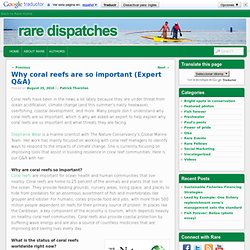
Many people don’t understand why coral reefs are so important, which is why we asked an expert to help explain why coral reefs are so important and what threats they are facing. Stephanie Wear is a marine scientist with The Nature Conservancy’s Global Marine Team. Her work has mainly focused on working with coral reef managers to identify ways to respond to the impacts of climate change. She is currently focusing on improving tools that assist in building resilience in coral reef communities. Here is our Q&A with her: A World Without Coral Reefs. Science & Environment - How can we save our dying coral reefs? I was the neoprene queen – Jacques Cousteau had nothing on me.
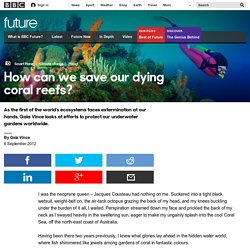
Suckered into a tight black wetsuit, weight-belt on, the air-tank octopus grazing the back of my head, and my knees buckling under the burden of it all, I waited. Perspiration streamed down my face and prickled the back of my neck as I swayed heavily in the sweltering sun, eager to make my ungainly splash into the cool Coral Sea, off the north-east coast of Australia. Having been there two years previously, I knew what glories lay ahead in the hidden water world, where fish shimmered like jewels among gardens of coral in fantastic colours.
More on Coral Reefs and Resilience or Ruination. 5:10 p.m. | Updated below | A spirited discussion has built on Dot Earth and elsewhere in response to the potent weekend Op-Ed article by Roger Bradbury of Australian National University challenging hopeful visions of coral reef restoration and calling them “zombie ecosystems” — the living dead — in a human-dominated world.
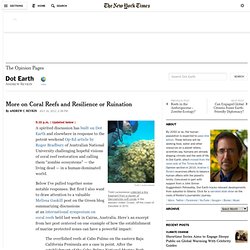
Below I’ve pulled together some notable responses. But first I also want to draw attention to a valuable Melissa Gaskill post on the Green blog summarizing discussions at an international symposium on coral reefs held last week in Cairns, Australia. Diving Into the Coral Triangle. Courtney CouchThe coral reefs of Sikka, Indonesia, are bastions of biodiversity.
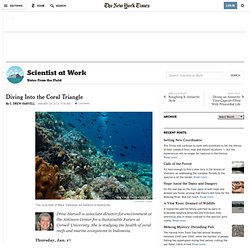
Drew Harvell is associate director for environment at the Atkinson Center for a Sustainable Future at Cornell University. Coral Grief: Warming Climate Threatens Reef Destruction. A survey of 704 species of coral—tiny polyps with hard shells, some of which form spectacular underwater reefs—has found that nearly 33 percent of them face a greater threat of becoming extinct as the globe warms.
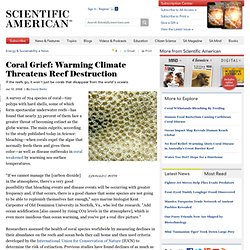
The main culprits, according to the study published today in Science: bleaching—when corals expel the algae that normally feeds them and gives them color—as well as disease outbreaks in coral weakened by warming sea-surface temperatures. "If we cannot manage the [carbon dioxide] in the atmosphere, there's a very good possibility that bleaching events and disease events will be occurring with greater frequency and, if that occurs, there is a good chance that some species are not going to be able to replenish themselves fast enough," says marine biologist Kent Carpenter of Old Dominion University in Norfolk, Va., who led the research.
"Corals are the backbone of the ecosystem," Carpenter notes, and reefs harbor roughly one quarter of all known marine species—from fish to algae. What would our Lives be like if the Coral Reefs Disappeared? « Adopt a Watershed. When we think about the ocean, the marine life, and the coral reefs, we don’t think about the impact these have on our lives.
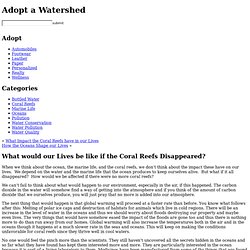
We depend on the water and the marine life that the ocean produces to keep ourselves alive. But what if it all disappeared? How would we be affected if there were no more coral reefs? We can’t fail to think about what would happen to our environment, especially in the air, if this happened. Coral reefs. Extinction threat 'a call to world leaders' at Rio Earth Summit. The International Union for Conservation of Nature (IUCN) has published its annual Red List, which details threats to animals and plants.
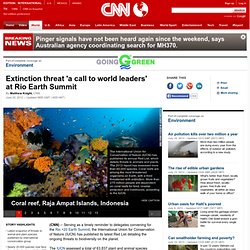
The 2012 report has assessed more than 60,000 species. Coral reefs are among the most threatened organisms on Earth, with a third threatened with extinction. More than 275 million people are dependent on coral reefs for food, coastal protection and livelihoods, according to the IUCN. The world's largest venomous snake is classified as "vulnerable" to extinction by the IUCN. Of the 63,837 total species assessed, 19,817 are threatened with extinction.
Native to Mexico, this species of iguana is not thought to be decreasing but is thought to be "vulnerable" due to its restricted geographical range. World's corals reefs are vanishing, report says. By Matthew Knight For CNN LONDON, England (CNN) -- The world has lost almost one-fifth of its coral reefs according a new report released by the International Union for Conservation of Nature (IUCN).

Coral reefs could be wiped out in 30-40 years according to a new report. Compiled by the Global Coral Reef Monitoring Network, the report has brought together the work of researchers from 15 countries with data stretching back 20 years. It's not just climate change -- which raises ocean temperatures and increases seawater acidification -- which is damaging reefs. In some parts of the world overfishing, pollution and invasive species are proving equally harmful. Scientists are warning that reef destruction will have alarming consequences for around 500 million people who rely on coral reefs for their livelihood. Left unchecked, remaining reefs could be completely wiped out by 2050, the report says.
Speaking from the U.N. But overall the biggest threat to reef survival is climate change. Report: 75% of coral reefs threatened. The percentage of reefs rated as threatened has risen by 30% in 10 years, according to a World Resources Institute report.
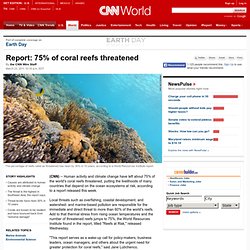
Causes are attributed to human activity and climate changeThe threat is the highest in Southeast Asia, the report saysThreat levels have risen 30% in 10 yearsCorals are known to be resilient and have bounced back from "extreme damage" (CNN) -- Human activity and climate change have left about 75% of the world's coral reefs threatened, putting the livelihoods of many countries that depend on the ocean ecosystems at risk, according to a report released this week. Local threats such as overfishing, coastal development, and watershed- and marine-based pollution are responsible for the immediate and direct threat to more than 60% of the world's reefs. Coral Reefs. All around the world, much of the world’s marine biodiversity face threats from activities and events such as Climate change causing global mass coral bleaching Coral bleaching results in white, dead-looking, coral (top image).

Healthy coral, by contrast, is very colorful and rich with marine life. (Images source: Wikipedia)